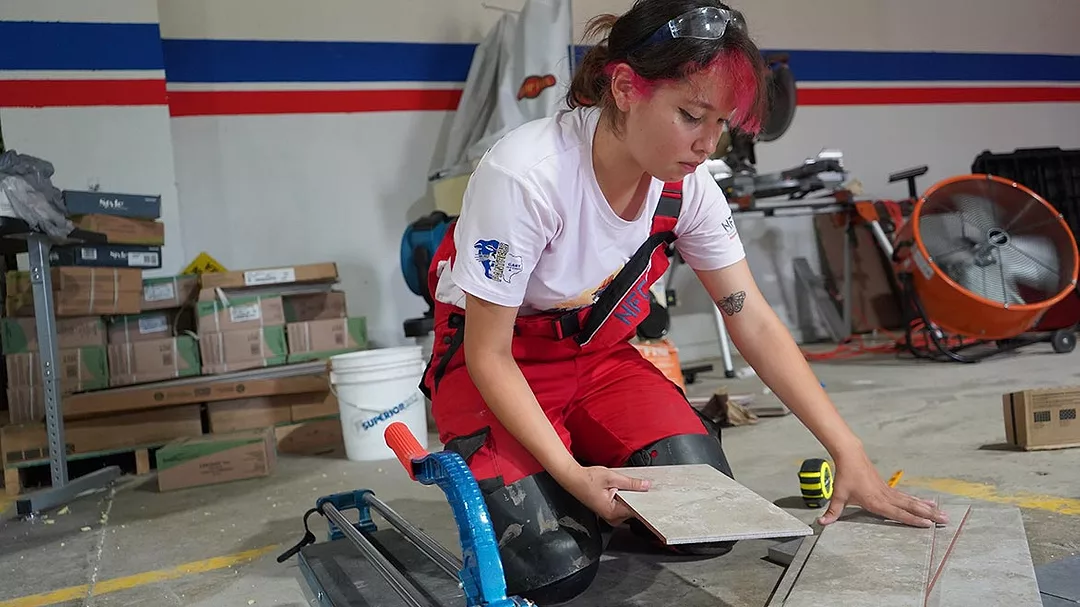NFCAP Students Share Their Flooring Installation Journeys

Britney Robles cutting engineered hardwood.
Photo: NFCAP.

Jeremy Moreno sanding hardwood floors.
Photo: NFCAP.

Kierstian Chavez cutting tile.
Photo: NFCAP.

Andrea Lopez posing in her NFCAP gear.
Photo: NFCAP.
Four National Flooring Contractors Apprenticeship Program (NFCAP) students graduated from the Gary Job Corps Center in San Marcos, Texas, to join the next generation of tile setters. Three of the students are completing their apprenticeships with J&R Tile, a five-star commercial tile contractor in San Antonio, Texas, and one has returned home to work with her uncle’s construction company.
Britney Robles, Jeremy Moreno, Kierstian Chavez and Andrea Lopez come from various backgrounds. Robles is a first-generation U.S. citizen and grew up with women who worked in roles including psychology, college recruitment and management. Moreno grew up helping his grandfather perform many trades and enjoyed learning how to build things. Chavez comes from a family of nurses, factory workers and carpenters. Lopez’s family is made up of skilled tradesmen and women. They all have one thing in common—an interest in art and creativity.
Job Corps has 121 locations across the country designed to provide skilled trade training to low-income students aged 16 to 24. NFCAP is in five of those locations and has plans to expand into more locations, according to Carlos Mangalo, program director of NFCAP. NFCAP is a 501(c)(3) non-profit that was launched in 2020 to place young adults in sustainable careers while helping to remedy the skilled labor shortage.
NFCAP’s program is structured so that potential apprentices go through a 10-week course, which vets them to find those who wish to move into a specific flooring category apprenticeship program.
Robles, Moreno, Chavez and Lopez sat down with Floor Trends & Installation at The International Surface Event 2024 to discuss the decision to become tile setters and flooring installers.
Britney Robles
Robles grew up in Farland, Texas, surrounded by strong, career-oriented women. At a young age, she recognized that she, like her family, possessed a strong sense of accomplishment. She remembers being creative and enjoying art—the tangibility of it.
She decided to enter into the trades.
“I wanted to get into construction because I felt like I needed something new, something that was gonna stimulate my brain a little bit more,” she said. “First, I wanted to look into carpentry, so I went to a trade school called Gary Job Corps. I actually went into a trade that was a little bit of every part of construction. I got to see different trades, and through that there was a partnership with NFCAP. Through that program, I got to see a lot of different kinds of flooring, and we saw different vendors and different companies come through and do trainings and presentations, and I got more interested in tile. As a finish trade, I think it gives you that satisfaction of ‘Wow, I did that. It looks great.’”
J&R Tile visited Robles’ class where they gave a presentation on commercial tile installation. Robles said, “They just wowed us. I decided to move to San Antonio and now I’m working for them.”
When asked what she enjoys most about commercial tile setting, she said, “I like that you get to see different kinds of tile installations in one project. You get to see a variety of different installation methods and finishing stuff like working with a large format tile more than the smaller tiles. Even with the sheets, like for the mosaic tiles, sometimes that takes forever just because you're adjusting so much. I think that's my favorite.”
Robles’ specialty in trade school was carpentry. She spent a lot of time learning how to use different saws and making intricate cuts—a valuable skill in tile setting. In addition to equipment and technique knowledge, Robles points out that she appreciated working with different installers “because they can all offer you different points of view and different information that you might not have learned from another person.”
Her education did not stop after Job Corps. “Britney has been trained in and is learning mitering tile and applying color-matching epoxy to the edging," said Erin Albrecht, owner of J&R Tile. "She has also been picking up skills in bullnosing and polishing marble!”
Jeremy Moreno
Looking back at his childhood in Pharr, Texas, Moreno remembers his family discussing how he would grow up as a doctor or fireman. Just like Robles, Moreno enjoyed art. He drew a lot as a kid. But he says he spent most of his time with his grandfather, a “Jack of all trades.”
“He basically did everything,” Moreno said. “He would take me everywhere he went to help him out. I was basically his little helper, and I appreciate that. Watching him work intrigued me. I was fascinated to see how buildings were built, but one [job] stood out to me, which is when we did our kitchen tile.”
Moreno watched his grandfather assemble the tile piece by piece, noting how it was installed, but he said carpentry never left his mind.
Years later, the pandemic hit. Moreno was jobless and decided to pursue construction as a career. He got the opportunity to take classes through Gary Job Corps, where he learned more about the various trade options. “We learned little bits of everything, and that program opened my mind even more,” he said. "I wanted to learn it all.”
Ultimately, he chose tile setting where he indicated that his favorite aspect of commercial tile is large format tile. “I like seeing one place change drastically,” Moreno said. “It’s mind-boggling to me to see how one place can switch appearance so quickly.”
The hardest part was learning the troweling techniques. “The hand movement with the trowel is the one thing I really struggled with—how the installers move their wrists and how they use their body weight to shift just a little bit,” he said.
Moreno has been working with J&R Tile for just under a year now and according to Albrecht, he has come a long way. “Jeremy's skills from on-the-job training have been in the area of custom mudwork, with curbless shower projects working with Sharkey Maldanado, a Certified Tile Installer,” said Albrecht.
She continues, “Britney and Jeremy are both progressing well in their apprenticeship. They aren't only picking up the hands-on skills of the trade quickly, Britney has become a ‘utility player’ on our team, learning project estimating skills, assisting our Chief Estimator Alison Gonzales when not in the field. They are also learning and becoming true professionals by completing modules in the related instruction component of their apprenticeship through NTCA University.”
Kierstian Chavez
Growing up in San Angelo, Texas, Chavez was into sports, specifically running and tennis. She said she comes from a long line of “hard workers” in the fields of nursing, carpentry, and manufacturing. She decided to enter the flooring trade.
“With flooring, you can make it however you want,” she said. “You can put your own designs into it. That's the first thing you see when you go into your house. You want your place to look pretty. That's why I like it. I love being creative with my place.”
Chavez graduated from Job Corps on April 18. Her focus was the Building Construction Technology (BCT) program. “I’ve learned everything from top to bottom on how to build anything,” said Chavez. “I could make a whole house with that program, and I excelled mainly in plumbing. Not a lot of people would expect that from me.”
Through NFCAP, she was exposed to all the various flooring categories. Chavez said she excelled at carpet and hardwood, and she fell in love with working with wood flooring. However, she struggled with controlling the floor sander. “I'm working out so I can hold it,” she said.
As for carpet, she got the opportunity to create her own small rug. She partnered with a friend to create her project. “We made a little smiley emoji, and then I made a smaller carpet for my boyfriend with our initials,” said Chavez. Here, she learned how to surge the edges, how to glue and how to put the ends in.
When she began her trade journey, she anticipated being handed the “light work” and not viewed as an equal by the men she had to work with. However, the reality was much different. “I've been at their level the whole time,” she said. “[They say], ‘Well, you know what you're doing.’ Of course, I know what I'm doing, and I can do it better.”
Andrea Lopez
Lopez grew up in Edinburgh, Texas, and enjoyed art as a kid but felt she would pursue Criminal Justice as a career. Her father is a carpenter, her uncle is an electrician, and her mother is a nurse. She ended up working in construction alongside her father, which she says provided her with a solid foundation for the BCT course.
“Most of my life I've been surrounded by men,” said Lopez. “I grew up there, so it was easy for me.”
Lopez says the BCT course has students participate in various trades, including electrical, plumbing and carpentry. Ultimately, she chose tile setting. When asked why, she said, “Well, I like to have backups. I like to know a little of everything. And, flooring is so cool. I mentioned before, I like arts, it has to do with your creativity.”
Lopez graduated from the Job Corps program on May 13 and is the newest addition to the J&R Tile team. She admits that her Job Corps experience has been an “interesting” journey, and the portion of the training that came easiest for her was the prep work, specifically the spreading of the materials.
Advice for the Next Generation
Robles, Moreno and Chavez offered a few tips for those considering flooring installation as a career.
“Ask a lot of questions,” Robles said. “Ask when they tell you to do something in a different way. It can surprise you why something is more important to do a different way because it can make or break an installation so quickly. Don't be afraid to get harsh feedback. Learn how to take critiques because it's going to help you. Be very open and want to learn.”
Moreno stresses the importance of the finished trade aspect found in a quality installation. “You're the last ones to leave, so they're gonna notice the floor,” he said. “It's the first thing you step on when you get out of bed, and it's the last thing you step off of when you go to bed. It shows the care that you put into it, and you can see the appreciation from the customers.”
Chavez points out that flooring installers will always be needed. “Every place has a floor, so there's jobs everywhere,” she said. “No matter where you go or how small the city is, people need floors.”
Looking for a reprint of this article?
From high-res PDFs to custom plaques, order your copy today!






